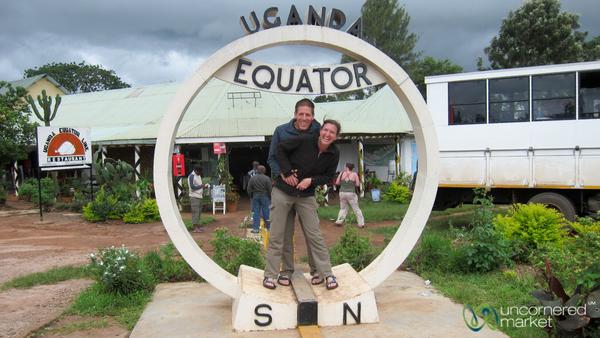Travelling with your partner can be incredibly fulfilling and relationship affirming. You experience the wonders of the world together and build a collection of shared memories that will last you for the rest of lives. It also provides the context to help you understand your partner in a whole new light.

One foot on each hemisphere in Uganda.
However, travelling together can bring new challenges and stresses to a relationship. It’s not always smooth sailing on the road. Travel, particularly adventurous travel outside of one’s comfort zone, reinforces how much is beyond our control: cancelled buses and flights, weather-shifted plans, and ill-timed illnesses. Amidst these trials, frustration and anxiety can rise to the surface and can cause conflict between partners. Just as the good times of travel can be shared, so too can those “bad” times be an opportunity to reflect together, become stronger and discover some of the deeper, hidden lessons that travel has to offer.
With that in mind, here are some of our approaches and tips from nearly 10 years of travelling the world together and how they’ve helped us grow closer over the years.
1. Stop and take a deep breath.
Sometimes, it may feel as though everything is going wrong when you’re travelling. A few small setbacks in succession can make a trip feel as though it is falling apart, or worse yet, your relationship is fraying. Amidst circumstances and emotions like these, the storm of conflict might feel like a juggernaut.
That’s when it’s time to stop, even for a short while. Take a few deep breaths in the middle of the emotional spiral and re-centre. You’ll likely gain some perspective on the situation and find that it really isn’t as dire as you first imagined, and that its broader impact — on your trip or your relationship — is quite small.

A romantic barista on Valentine’s Day.
This space will also allow you to respond rather than react, meaning that you can deliberately choose your actions, including working together with your partner to not look back at mistakes and missed opportunities, but to look forward to what’s ahead and how you’ll enjoy it.
2. Abandon the “perfection narrative.”
We are bombarded with images and stories in books, TV shows and social media that imply that relationships worth having are picture perfect, especially when on that HDR photo–filled vacation of a lifetime. This makes it seem like anything less means you’ve failed.
Our advice: manage your expectations. No relationship is 100 percent perfect; each of us is human, armed with strengths pared with weaknesses. Any long-term relationship is difficult work that involves invariable ups and downs. Sometimes it thrives, sometimes it falters and most of the time, it steadily moves toward shared goals.

Not looking pretty, but so proud of each other at the top of Mt. Kilimanjaro.
If each and every day that you’re travelling together isn’t that ideal image you had in your head, that’s not failure, that’s normal. When you recognize this then perhaps you can accept your partner’s faults and he can love you for all of yours. And that’s how you grow stronger… together.
3. Communicate. And then communicate some more.
When you spend so much time with a person, it’s easy to believe that you can read each other’s mind without speaking. Don’t fall into this trap; over-communicate if you must.
Avoid making assumptions about what the other person is thinking or feeling. Aim to communicate actively and honestly. Ask questions and share what’s going on in your head, particularly if something happens to bother or concern you. You’ll both benefit from making this extra effort.
4. Create mental space.
When physical space is limited, as it often is on the road, learn to create mental space. This means it’s perfectly acceptable to carve out personal time, even when you are seated right next to one another. Perhaps especially then.
This may mean being in each other’s company for hours on end — whether on a bus or in hotel room — without talking to each other. Silence like this allows each person to retreat into himself and use that mental space to recharge or reflect.
If one or both of you is an introvert (i.e., someone who derives energy from time alone), this is especially important.
5. Recognize strengths and weaknesses.
Some of us may be loath to admit it, but we cannot maintain perfection in all that we do. We are human; we each have preferences and natural skills, blind spots and weaknesses. When you travel with a partner, think of yourselves as a team. Try to assess each person’s strengths in order to leverage them. Similarly, identify the weaknesses in order to better manage them.

Lost as usual, trying to find our way on Google Maps, on a bike ride in northern Bangladesh.
There will, of course, be situations when you both share the same weakness. In this case, recognize it — even laugh about it — and do the best you can to share the burden. In our case, neither of us possesses a good sense of direction. This has not improved, even after all these years of travelling the world. Even with a map (physical or digital ) we’ll often get turned around. Instead of becoming frustrated with each another and angry about this, we accept that we’ll likely get lost… like, all the time. No joke. We enjoy it, manage it, and often use it to our benefit to discover things we would have never come across otherwise.
6. Divide tasks and share the burden.
Travel takes a lot of planning, decision-making and execution on the fly. Tasks exist that neither of you wishes to do (or neither of you considers playing to a strength). Be honest and recognize which tasks these are and divvy them up so that both of you share the work. Otherwise, one of you may feel unduly burdened and resentful.
Given all the travel we’ve done, it surprises most people that neither of us really enjoys the logistical planning required for the trips we take. Once we’re on the ground, we’re great and good to go, but it’s navigating all those logistics decisions before we arrive that for us is a necessary evil.
Therefore, we divide these tasks by divvying up regions, cities or chunks of time (e.g., one person has responsibility for one week, the other person the next week). We occasionally even resort to “My Day, Your Day” technique of assigning alternating responsibility of decisions great and small.
7. Understand that sometimes it’s physical.
Are there times when your partner turns into an irrational devil for no apparent reason? And the change can happen from one minute to the next?
Learn to recognize the signs of when your partner might be suffering from a physical impairment like low blood sugar, dehydration, extreme fatigue, illness, or hormones. Once you see the signs, try to address the physiological need immediately by finding food, a place to rest, or whatever might help. If you’re in a situation where you don’t have resources available (e.g., on a bus with no food), then put your armour on and realize that your partner’s behaviour is connected to something physical. In other words, don’t take it personally.

Regular snacking helps keep “hangry” away.
Although I try to manage my blood sugar actively, there are still times on the road the time between meals goes too long, and I can turn into an incoherent mess in a matter of minutes. It’s not a pretty sight, nor an enjoyable situation for Dan. So, we both try to actively manage this for one another by carrying snacks with us and actively checking in on each other’s mental and physical “temperature.”
8. Laugh often, including at yourself.
Laughter is a great stress reliever and can change the mood immediately. When things get tough, tell a bad pun or joke, show off your best karaoke skills and belt out a cheesy song, or do whatever you need to do in order to break a too-serious mood.

Laughing through the terror of a tandem bungy jump.
You’ll both feel better after a good laugh, and the situation likely won’t feel quite so overwhelming anymore. Or, at least you’ll be more mentally prepared to deal with it productively.
9. Try not to do it all.
It’s easy to try and “make the most” of your vacation by trying to do it all in a relatively short period of time. We understand this urge. We’ve been there so many times we’ve lost count.
Try to resist and focus on a few key highlights or experiences to spend time with rather than a laundry list of sites that leaves you in a heap of exhaustion at the end of your travels. In travel, as in life, less is often more.

Taking time to be still and appreciate the moment: a beautiful sunset.
This approach does wonders to manage fatigue and burnout, which can lead to nitpicky arguments and relationship fray. Not to mention, the experiences you choose to focus on will be richer. You’ll have more space to observe and appreciate each moment. And at the end of the day, you’ll have the time and bandwidth to come together with a glass of wine (or however you choose) and reflect on those experiences, including what each of you learned or took away from them. These are often the most precious moments of a trip.
10. Don’t take things for granted.
When you spend so much time together, it’s dangerously easy to take your partner and all that he does for you and the relationship for granted. Additionally, we sometimes forget to actively appreciate our shared experiences and time together with someone we love. Not to be morbid, but we’ve seen repeatedly how life circumstances can shift under our feet in an instant and deprive us of what we’ve taken for granted.
Even if you believe your partner knows it, make it a regular practice to tell him how you feel and how much he means to you. Additionally, try to take time out regularly to reflect on how fortunate you are to be able share these experiences with each other.
Getting There
G Adventures runs a number of departures encompassing a wide range of departure dates and activities to cater to different tastes. We’re thrilled at the prospect of showing you this big blue planet of ours — check out our small group trips here.























